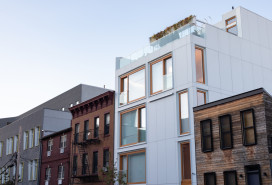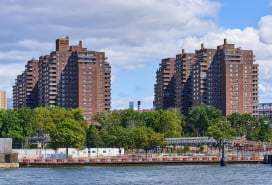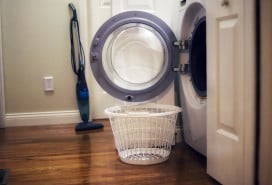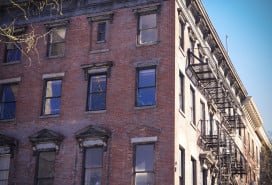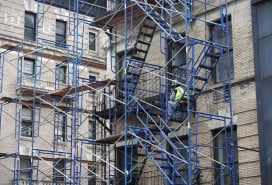Ask Sam: Can I get evicted because of my neighbors' noise complaints?

I'm a musician, and my downstairs neighbors complain constantly about the noise I make practicing (and sometimes, even just walking around). They've taken their complaints to the landlord, too. Can I actually get evicted for this? And what happens if I'm the one getting disrupted by noise?
While it's wise to stay on good terms with the neighbors—and your landlord—things would have to get pretty extreme before you get the boot from your apartment, says Sam Himmelstein, a lawyer who represents residential and commercial tenants and tenant associations.
But unfortunately, dealing with neighbor noise (or complaints about it) is a standard-issue facet of city living. "This is a very common problem," he notes. "Sometimes, I hear from the people who are complaining about the noise, and sometimes, the people who are supposedly causing it." As such, there's a long line of court cases about this issue, and "it's pretty much accepted law that you have to put up with a certain amount of noise," says Himmelstein, "as long as it's not unreasonably loud or happening during hours when people would be sleeping."
Or, in the eloquent words of a judge who ruled on a 1943 case about an apartment-dweller's "objectionable" piano-playing: "Apartment-house living in a metropolitan area is attended with certain well-known inconveniences and discomforts. The peace and quiet of a rural estate or the sylvan silence of a mountain lodge cannot be expected in a multiple dwelling."
Mostly, things come down to common courtesy. "You can't blast your stereo at midnight or have really loud parties," says Himmelstein, "but if someone tries to bring a court case about ordinary noise—the pitter patter of children's feet, furniture moving as people get up front the dinner table, walking around the apartment—they won't get anywhere." (New York courts have also specifically ruled that you can't get evicted over the sound of your kids running around the apartment.)
Of course, you'd rather not end up in court at all, so your best bet is to try to come up with a practical compromise, like putting down rugs. "It's always better than going to lawyers and spending thousands of dollars, especially when a court might mandate the same solution," says Himmelstein, who notes that he's seen musicians seek a landlord's permission to put a layer of sound insulation into the apartment. "The practical solutions, while they involve spending some money, tend to result in an actual solution, whereas you never know what will happen in court," he says. And even if things do become litigious, unless you're really going out of your way to make life for your neighbors miserable, "eviction is the last resort," he says. Instead, most judges will give you a chance to "cure" the problem before taking next steps.
Co-op shareholders, on the other hand, should tread very carefully, as it’s far easier for them to be evicted for noise than it is for renters. Depending on the language in your proprietary lease, your neighbors can complain to the co-op board who may then charge you with “objectionable conduct” due to excessive noise. And if the board or shareholders vote to terminate your lease, you could be given the boot.
“The courts have very little authority to review a decision of the board due to what is known as the 'business judgment rule' that— and the board does not have to provide full due process,” Himmelstein says.
If you’re the one being bothered, keep in mind that the city will issue noise violations when the issue stems from an outside source, but generally not from a neighbor. (You’ll have to go to your landlord—or the NYPD—for that.)
“If you live above a noisy bar that’s playing music late at night, or if your landlord puts a fan or air conditioning unit on the roof that’s really loud, you can get the city to place a noise violation on the building,” Himmelstein says.
NYC’s noise code specifies what constitutes “excessive noise” and details how to file a complaint. Under the noise code, the sound from a bar that plays music, for instance, must be no louder than 42 decibels as heard from inside nearby residences. If you're losing sleep—and sanity—to noise from a neighbor, work in the building, or the bar downstairs, Himmelstein recommends bringing in a sound expert like Acoustilog to measure decibels and prove that the level of noise is unreasonable.
If an expert finds that noise from disruptive work your landlord is doing exceeds the legally permitted decibels, you're likely entitled to a rent abatement. One option is to bring an HP action to court against your landlord.
“I’ve done that for clients and been successful, and gotten a judge to order them to correct the noise problem.” Himmelstein says. “But it can’t just be subjective. It has to be based on objective measurements.”
But if it's construction out on the street? You're at the mercy of 311.
Related:
Ask Sam: I'm a co-op shareholder and I've been accused of 'objectionable conduct.' How do I respond? (sponsored)
Ask Sam: Can I be evicted for smoking pot? (sponsored)
Ask Sam: My landlord's renovation is making my life miserable. What are my rights? (sponsored)
Ask Sam: How do I find out if my apartment should be rent-stabilized—and if the landlord owes me money? (sponsored)
Ask Sam: What's a "Major Capital Improvement," and does it really mean my landlord can raise the rent? (sponsored)
See all Ask a Renters' Rights Lawyer
Sam Himmelstein, Esq. represents NYC tenants and tenant associations in disputes over evictions, rent increases, rental conversions, rent stabilization law, lease buyouts, and many other issues. He is a partner at Himmelstein, McConnell, Gribben, Donoghue & Joseph in Manhattan. To submit a question for this column, click here. To ask about a legal consultation, email Sam or call (212) 349-3000.

